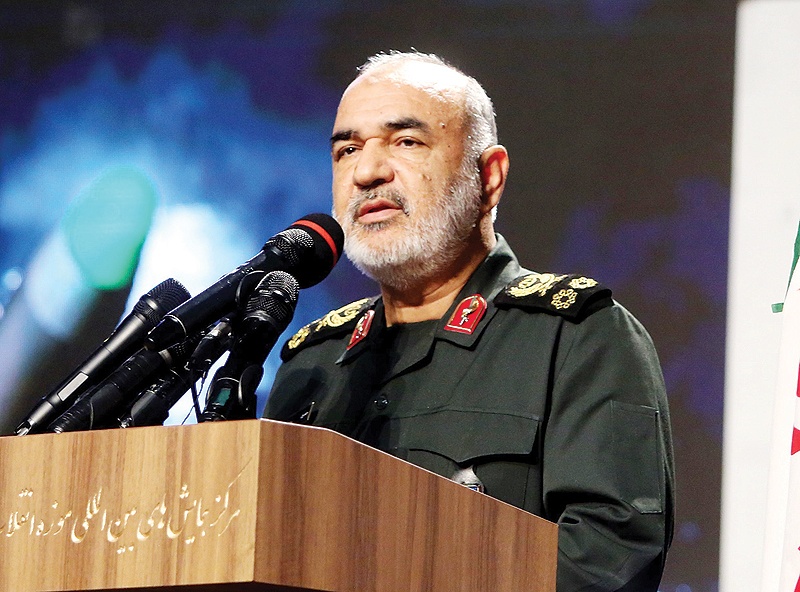
TEHRAN/BAGHDAD: The commander of Iran's Revolutionary Guards said yesterday that destroying archrival Israel has become an "achievable goal" thanks to his country's technological advances. "This sinister regime must be wiped off the map and this is no longer… a dream (but) it is an achievable goal," Major General Hossein Salami said, quoted by the Guards' Sepah news site. Four decades on from Iran's Islamic revolution, "we have managed to obtain the capacity to destroy the imposter Zionist regime", he said.
Salami's comments, while not unusual for Iranian officials, come amid particularly heightened international tensions over Iran's nuclear program and a series of incidents that have raised fears of a confrontation between Tehran and its other main regional rival, Riyadh. The United States, which withdrew from a landmark nuclear deal between Iran and world powers in 2018, has imposed a campaign of "maximum pressure" - with vocal support from Israeli Prime Minister Benjamin Netanyahu.
The comments by the commander of Iran's ideological army were given prominent coverage by the Tasnim and Fars news agencies, close to ultra-conservative political factions. The official IRNA agency also carried his remarks, but placed more emphasis on his assertion that Iran was growing stronger and would finally beat its foes despite "hostility" towards it. In contrast, foreign ministry spokesman Abbas Mousavi in a tweet wished "Happy (Jewish) New Year to our Jewish compatriots and to all true followers of great prophet Moses (PBUH)". Mousavi's greeting was written in Persian, English and Hebrew.
Iran only has a few thousand Jews left compared to between 80,000 and 100,000 before its 1979 revolution. The country has been consistently hostile towards Israel since its revolution, and Tehran openly supports anti-Israeli armed groups including Palestinian Hamas and Lebanon's Hezbollah. Israel considers Iran its archfoe and has carried out hundreds of strikes in neighboring Syria against what it says are military targets of Iran and its Lebanese military ally Hezbollah. It has vowed to keep Iran from entrenching itself militarily in the war-torn neighboring Arab state.
In June 2018, supreme leader Ayatollah Ali Khamenei reaffirmed Tehran's long-held position that Israel is "a malignant cancerous tumour that must be removed and eradicated". But he has also said that Tehran has never called for the Jews to be "thrown into the sea", unlike Arab leaders such as the late president Gamal Abdel Nasser of Egypt. Iranian generals routinely express the desire to destroy Israel or claim to be able to wipe out Tel Aviv. However, official discourse in recent years has generally taken care to clarify that the Jewish state will cease to exist because of its own "arrogance", not because of an attack by Iran.
Meanwhile, Iraq's premier has said for the first time that his government had "indications" Israel was behind some attacks on paramilitary bases this summer, but stopped short of making an explicit accusation. The Hashed Al-Shaabi force has blamed the series of explosions at its bases and arms depots on Israel and the US, but the central government had so far said it was still investigating.
In a first, Prime Minister Adel Abdel Mahdi told Al-Jazeera television in an interview aired yesterday that those investigations were nearing a conclusion. "Some of the investigations carried out by Iraqi authorities provided important indications that Israel was behind some of these attacks," he said, in excerpts of the interview seen by AFP. Abdel Mahdi said he had even "heard from the Americans" that Israel was involved but that his government still lacked "tangible evidence".
The blasts at five Hashed bases have been a threat to Baghdad's precarious balancing act between its two main allies, Washington and Tehran. Top Hashed officials said the US was broadly "responsible" but specifically blamed Israeli drones for an August 25 strike that killed a Hashed fighter near Iraq's western border with Syria. The Pentagon has denied responsibility and said it is cooperating with Iraq's investigations, while Israel has neither confirmed nor denied involvement.
The Iraqi government had thus far said it was studying evidence of foreign involvement, and even last week Abdel Mahdi told reporters there was no conclusive proof. But MP Ahmad al-Assadi said Friday that he and fellow parliamentarians were briefed on Israeli involvement by Faleh Al-Fayyadh, the premier's national security advisor and head of the Hashed. "He told us that the investigative committees proved that at least three of the incidents were external attacks, including two by Israel," he told AFP.
Assadi, who is also a leading Hashed official, said he did not know why the government had not made those results public. The Hashed was established in 2014 from mostly-Shiite armed groups and volunteers to fight the Islamic State group, and is now formally part of Iraq's armed forces. The US and Israel fear some units are an extension of their arch-foe Iran and have been equipped with precision-guided missiles. Israel has admitted to carrying out hundreds of strikes on pro-Iran paramilitary units in neighboring Syria, which added fuel to suspicions it was behind those in Iraq. Last month, Iraq's foreign ministry threatened to submit a complaint to the United Nations once the investigations were complete. - Agencies










